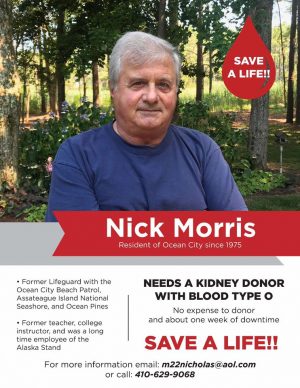
BERLIN – A Berlin resident is searching for a living kidney donor to save his life.
In December of 2017, Berlin resident Nick Morris learned he would eventually need a new kidney.
“This problem was initially caused by an enlarged prostate, which created a blockage and backup into the kidneys,” he said. “If you do that over an extended period of time, it damages your kidneys.”
In spite of the diagnosis, Morris said his condition has remained stable. But he said it is only a matter of time before he would need a kidney transplant.
“I don’t need dialysis right now so one big goal is to get a transplant before dialysis is necessary,” he said.
Morris said he has started to notice the toll his kidney disease has had on his energy levels.
“The kidneys are very important, and if you have an issue with your kidneys everything slows down …,” he said. “I’ll wake up in the morning and I’ll be at like 60% and after I go to work and do what I need to do I’m at 40%. If it’s hot, it compounds that problem.”
Earlier this year, Morris began the evaluation process to be put on the national waiting list for a deceased donor. That process, however, came with an unexpected setback.
“I was a good candidate but basically what it boiled down to for me was I was too old …,” the 73-year-old said. “I have no other health issues.”
Debora Evans, one of the pre-transplant coordinators for kidney and pancreas at the University of Maryland Shore Medical Center at Easton, said recipients wait an average of six years for a kidney. With an identified living donor, the wait is reduced to months.
“In the state of Maryland, we have well over 1,000 people on the University of Maryland’s transplant waiting list for kidneys …,” she said. “Not only is time an advantage to having a living donor, but it’s also a better-quality kidney and the kidney tends to last longer. Less rejection and better quality.”
Evans said living donors must go through a stringent process to determine if they are eligible to donate a kidney.
“If all looks good, then we start the process,” she said. “At any point they could be ruled out based on their medical results. We are careful with the donors and our selection to make sure we do no harm to them.”
Because most humans have two kidneys, it is one of the few organs that can be transplanted from a living donor. While a living donor may be incompatible with the recipient, Evans said the two can participate in a paired kidney exchange.
“We have the ability to do a paired kidney exchange so that donor A can give to recipient B and donor B can give to recipient A,” she said. “That way, everyone can donate and transplant, but just not to the person that they originally intended.”
Morris said he has started a serious search for a living kidney donor. In recent weeks, he has posted flyers on the Boardwalk and in other public areas.
“I’ve already gotten a contact,” he said. “I was surprised. It was someone who formerly lived in Ocean City and has moved to Texas. She’s 67, so I don’t know how viable the option is. With a donor, the younger the better.”
Evans said the transplant process has made significant advancements over the years. In addition to a better understanding of the body’s immune system, she noted the transplant technique has greatly improved for living donors.
“We can now remove the kidney laparoscopically,” she said. “It used to be a 12-inch incision, removing a rib, being in the hospital for five days and being out of commission for three months, very painful for the donor. Now, they are in and out of the hospital in two days and back to work within two or three weeks and their incision is literally inside the navel with three little port marks on the abdomen.”
Morris added that there is no cost to the living donor.
“All of the medical expenses are paid for,” he said, “and I would handle all the additional expenses, like if someone had to travel from a distance and needed lodging.”
Morris said he has started sharing his story with the community he has called home since 1975. In doing so, he said he has found many residents who were once in the same position.
“The more I talk to people, I’m surprised by the number of people, even prominent local people, who have had transplants,” he said. “I just didn’t realize it.”
In addition to being a former educator, Morris is also a former lifeguard with the Ocean City Beach Patrol, Assateague Island National Seashore and the Ocean Pines Recreation and Parks Department. He was also a long-time employee of the Alaska Stand, the Atlantic Stand, Dumser’s and the Commander Hotel.
Potential donors can contact Nick Morris at [email protected] or call 410-629-9068.
Additional information on the transplant process can be found on the National Kidney Foundation website, www.kidney.org.
“I want to live for as long as I can,” he said.

